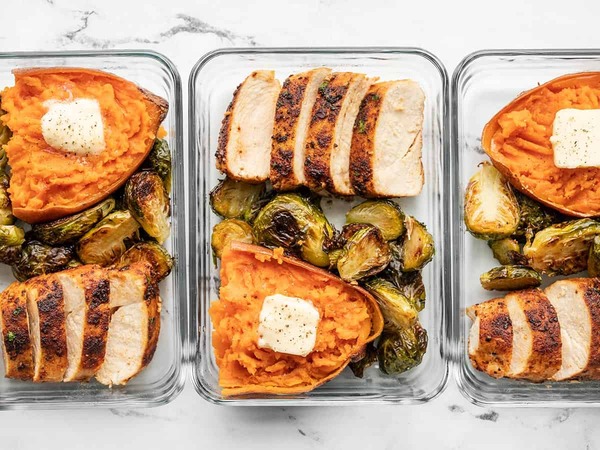


n the fast-paced world we live in, maintaining a balanced diet can often feel like an elusive goal. The demands of work, family, and daily life can leave us with little time and energy to focus on what we eat. However, efficient meal planning and preparation can be your secret weapon for achieving a well-rounded diet while saving time and reducing stress. In this blog, we’ll explore strategies for successful meal planning and prepping, giving you the tools you need to take control of your nutrition and lead a healthier, more balanced life.
The Importance of Meal Planning and Prepping
Before we delve into the strategies, it’s crucial to understand why meal planning and prepping are so essential for achieving a balanced diet:
- Nutritional Control: Planning your meals in advance allows you to ensure that your diet is well-balanced and tailored to your specific needs. It also reduces the likelihood of resorting to unhealthy convenience foods when you’re hungry.
- Time and Stress Management: By setting aside dedicated time to plan and prepare your meals, you reduce daily decision fatigue and stress associated with what to eat. This leaves you with more time for other activities and minimizes the chances of making impulsive, unhealthy food choices.
- Cost-Efficiency: Meal planning can save you money by helping you shop strategically, avoid food waste, and minimize the temptation to eat out or order takeout.
- Healthier Choices: With a well-thought-out meal plan, you’re more likely to incorporate a variety of nutritious foods into your diet, reducing your reliance on processed or fast food options.
Now, let’s explore some practical strategies for efficient meal planning and prepping:
Strategy 1: Set Clear Goals and Priorities
The first step in successful meal planning is setting clear goals. Consider what you want to achieve with your diet. Whether it’s weight management, muscle gain, improved energy, or better overall health, your goals will guide your meal planning decisions. Prioritize foods that align with your objectives and create a meal plan that supports them.
Strategy 2: Create a Weekly Meal Plan
Once you’ve set your goals, start planning your meals for the week. A well-structured meal plan should include a balance of macronutrients (carbohydrates, proteins, and fats) and micronutrients (vitamins and minerals). Aim for variety and incorporate whole foods like fruits, vegetables, lean proteins, and whole grains. A typical meal plan might include:
- Breakfast: Oatmeal with berries and nuts
- Snack: Greek yogurt with honey and a piece of fruit
- Lunch: Grilled chicken salad with mixed greens
- Snack: Hummus and vegetable sticks
- Dinner: Baked salmon with quinoa and steamed broccoli
Strategy 3: Prep Your Ingredients
Once your meal plan is set, it’s time to prep your ingredients. Dedicate a day or two each week for meal prep. This involves washing, chopping, and portioning ingredients so they’re ready to use in your recipes. This step saves you time during the week and makes it easier to stick to your plan.
Strategy 4: Batch Cooking
Batch cooking is a powerful strategy for meal planning and prepping. Choose a day to cook larger quantities of specific meals that can be portioned out for the week. For example, cook a big pot of chili, curry, or stir-fry and divide it into single servings. Store them in airtight containers, and you’ll have convenient, healthy meals ready to go.
Strategy 5: Embrace Freezer-Friendly Meals
Incorporate freezer-friendly meals into your meal planning. Soups, stews, casseroles, and sauces often freeze well. You can make larger batches, portion them out, and freeze for those days when you have little time to cook. It’s a convenient way to ensure that you always have a healthy option available.
Strategy 6: Portion Control
Maintaining portion control is vital for ensuring that your meals stay balanced and aligned with your goals. Invest in a food scale and measuring cups to help you portion your meals accurately. This practice can help prevent overeating and control calorie intake.
Strategy 7: Stay Organized
Effective meal planning requires staying organized. Keep a list of your go-to recipes, so you don’t have to think about what to cook each week. Invest in quality food storage containers to keep your prepped ingredients and meals fresh. Consider using a meal planning app or a physical planner to keep track of your weekly meal plans and grocery lists.
Strategy 8: Be Adaptable
While planning is essential, it’s equally important to remain adaptable. Life can throw unexpected curveballs, so be prepared to adjust your plan as needed. Don’t stress if you need to switch a meal or make a last-minute substitution. The key is to maintain balance over time, not perfection in every single meal.
Conclusion and Call to Action
Meal planning and prepping are powerful tools for achieving a balanced diet while reducing stress and saving time. By setting clear goals, creating a weekly meal plan, prepping ingredients, and staying organized, you can take control of your nutrition and lead a healthier life. It’s time to make a commitment to your health and well-being.
However, if you find meal planning and prepping overwhelming, or if you want personalized guidance to meet your unique goals and lifestyle, we’re here to help. Our certified nutrition coaches are ready to assist you in implementing a meal plan that suits your needs. Schedule a meeting with one of our experts today, and take the first step towards a healthier, more balanced you. Your journey to better nutrition starts now!
